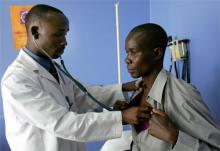
The National Institutes of Health (NIH) has authorized a three-year study to find out why some HIV-positive homosexual men in Kenya are not seeking the free treatment that American taxpayers already are funding. (AP File Photo)
(CNSNews.com) – The National Institutes of Health (NIH) has authorized a three-year study to find out why some HIV-positive homosexual men in Kenya do not seek the free treatment that American taxpayers already are funding.
The study, which will cost U.S. taxpayers $228,147, seeks to encourage Kenyan homosexuals, including prostitutes, to avail themselves of the AIDS treatment known as antiretroviral therapy (ART)–and to continue taking it once they start.
“Although men who have sex with men (MSM) are at very high risk for HIV globally, this group has only recently become an important focus of national HIV/AIDS programs in sub-Saharan Africa,” the project description says.
“While it is clear that antiretroviral therapy (ART) can reduce AIDS-related morbidity and mortality and prevent sexual transmission from HIV-infected MSM, little is known about antiretroviral adherence and barriers to care among African MSM.”
Researchers say they have worked with male prostitutes on the Kenyan coast since 2005 and have found “significant disparities” among people who seek treatment and continue with the therapy, partly due to “stigma and social isolation.”
The project, which began last month, plans to address the “treatment gap” by supporting African MSM as they begin treatment and by sending regular reminders to promote the continuation of anti-retroviral therapy.
Researchers say the project is “consistent with” priorities set by the NIH Office of AIDS Research on “reducing HIV-related disparities and improving disease outcomes for HIV-infected individuals.”
The study’s lead researcher, Dr. Susan Graham of the University of Washington, told CNSNews.com that antiretroviral therapy is free in Kenya, supported by PEPFAR — the U.S. President’s Emergency Plan for AIDS Relief — and other donor programs.
In fiscal year 2011, the U.S. government spent $517.3 million in U.S. taxpayer dollars to bring AIDS treatment free of charge to hundreds of thousands of Kenyans with HIV/AIDS. Between FY 2004 and 2011, PEPFAR funding for Kenya alone totaled almost $3 billion.
And that doesn’t include the tens of millions of dollars received from the United Nations, private donors, or the Kenyan government, which has made combating AIDS among high-risk populations—including homosexuals — a top health priority for the nation.
According to Graham, the social stigma against homosexuality is a major barrier for HIV-infected men to seek treatment.
Asked about the study’s cost to American taxpayers at a time of tight budgets and mounting U.S. debt, Graham said she wouldn’t presume to get judge the government’s policy and budget choices.
“I do think Americans have an interest in supporting global health efforts worldwide,” she said, adding that the PEPFAR program has been a “huge success in terms of saving lives, promoting health, and fostering both good will and opportunities to improve health systems in the countries where it is active.”
According to the United Nations, approximately 1.6 million people in Kenya were living with HIV/AIDS in 2011, and 6.2 percent of the people 15-49 tested positive for the virus. An estimated 493,000 were receiving antiretroviral treatment.
The study, which includes investigators at the University of Washington, Kenya Medical Research Institute, University of Oxford, and Brown University, will rely in part on in-depth interviews and focus groups involving HIV-positive Kenyan MSM to find out why they might avoid treatment and what might change their minds.
“By involving MSM, Kenyan LGBT organizations, HIV care providers, and Ministry of Health representatives, we will ensure that the resulting intervention is feasible, acceptable, tolerable, safe, and ready to be tested for efficacy,” the project description says.
The study runs through April 2016.
Source material can be found at this site.









